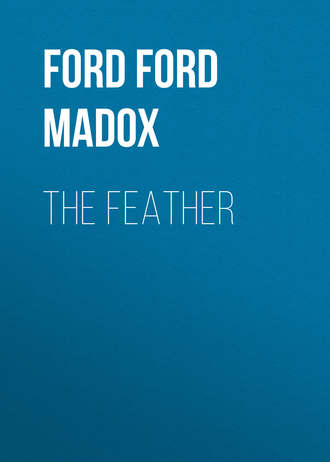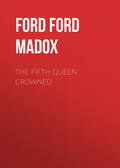
Форд Мэдокс Форд
The Feather
‘That’s the storm coming down again,’ Wopole went on. ‘Hurry to the helm and put it hard down when I hoist the sail, for the cable will snap like thread before it. Quick – quick!’
The Princess ran like lightning along the deck, for the sea was quite quiet, and the vessel hardly pitched at all, and she reached the helm in a very few minutes.
When she got there she stood still and listened. Everything was quiet and still; the vessel only rolled slightly, and the cordage creaked uneasily, as if it feared the coming strain that it would have to stand. From where the sea boiled a noise came – so low and grumbling that it might have been the faint growl of an angry cat before it makes a spring.
Just then Wopole looked towards the helm:
‘Mind and put it hard down!’ he shouted.
‘I wonder why he wants me to put it down,’ she thought.
But before she could ask the storm was upon them again. Swifter than the arrow leaps from the bow it came, and the churned sea fled from the attack of the wind like a mighty white horse. The flying scud and rain beat mercilessly against her face; but she held bravely to the tiller, and stemmed the storm as well as she could, with her eyes shut and her teeth set.
The noise the storm made would have frightened Neptune himself; but high over it she heard Wopole shout:
‘The cable’s parted! Hard down!’
And she pressed on the tiller as hard as she could; but the stubborn bar refused to go down, and though she leant her whole weight on it, it only fell away to one side, and she had only strength to lie against it in vain hope of putting it down. Just then the sail began to raise itself, and the vessel seemed to feel its influence, for it was turning slowly round. Suddenly she saw Wopole appear in the mist of rain.
‘Let me have the tiller!’ he shouted; and she let go. Instantly he seized it and pushed it the other way with all his might.
But at this critical moment a disaster happened, that made it look as if everything had conspired against them. The tiller broke in half under the strong hands of Wopole, and before they could wink the vessel had turned its back to the wind, and they were carried at racing speed towards the end of the world. They had but a mile or so to go, and a mile is soon covered.
The last part of the journey was through a thick mist; but it didn’t much matter to Ernalie.
‘Anyhow, Wopole won’t be able to cut the strings,’ she thought.
Just then the fog began to get lighter, as if some great fire were just outside it, and in a few seconds they burst through the veil of mist into a light so blinding that the Princess could not keep her eyes open.
‘This must be the sun we’ve fallen into,’ she thought. ‘But it doesn’t seem very hot.’ Then there was a bump, as if the boat had run into a lump of mud, and then a greasy slide, and then Ernalie fainted.
When she came to herself, she heard voices close to her. One sounded like the voice of an old man, and the other, she was quite sure, was that of Wopole; but she had never heard him so polite before. They had evidently only just met, for Wopole was saying:
‘I am very happy to make your acquaintance, sir. May I trouble you to tell me your name?’
‘It’s a great deal of trouble,’ grumbled the other; ‘but I’ll tell you. I’m the Man.’
‘How strange – I too happen to be a man.’
‘You’re only a man. I’m the Man.’
‘The Man in the Moon, I should think?’ said Wopole.
‘Exactly,’ answered the voice.
‘Why, we must be in the moon,’ thought the Princess; and it was the case, for the ship had run right over the edge of the world on to the moon, which had been hidden behind the clouds.
‘I’ll just go and look at him,’ she said to herself, and so she sat up to look where the voices came from. ‘They seem to be behind the sail,’ she went on. So she walked to the sail, and peeped round the corner, and there sure enough he was.
I daresay you’ve often seen the Man in the Moon – at all events, you ought to have. Perhaps you mayn’t have; if so, this is what the Princess saw.
He was a very old man, and looked very much as if he was in his second childhood, and he carried an enormous lanthorn, which made him even more bent than he might have been if he had not carried it so often. On his shoulders he carried a bundle of thorns, which appeared to prick him and cause him a good deal of uneasiness generally; and besides this he had an ugly little dog by his side, which made continual attacks on Wopole’s shins, and it made such a noise with its barking that the old man in a temper aimed a vicious kick at it; but he missed his mark, and the weight of the lanthorn overbalancing him he sat down rather suddenly, and during the rest of the evening he remained there.
But the conversation proceeded just as if nothing in particular had happened.
‘Being the Man in the Moon, perhaps you would be so kind as to direct me to the place where the Misses Parker reside?’ Wopole said.
‘That I won’t,’ said the Man. ‘Why should I?’
‘I thought that you might be so good as to direct me, and I had intended presenting you with a loaf of bread. However, that does not matter. Good-day. I daresay I shall find the house by myself,’ and Wopole made preparations for getting over the side of the vessel.
But the Man no sooner heard the word ‘bread’ than he became very eager to help him on the way.
‘Oh, wait a minute,’ he said; and Wopole accordingly waited.
‘If you’ll give me two loaves I’ll show you,’ he went on.
‘I’ll give you one now, and the other when I have paid my visit and am safely back on the ship.’
‘Well, that’ll do. Give me the one, and I’ll show you at once.’
So Wopole went to the hatch which covered the pantry and took out a large loaf, which he handed to the old Man.
‘Now trot,’ he said; and the Man hurried to the side of the vessel and scrambled down as well as he could, followed by Wopole and the Princess.
It was curious how bright it was when they got over the side; for although it was past nine o’clock p. m. by the Princess’s watch, the ground itself seemed to shoot out light, and what was still more funny, they threw no shadows, although that was easily explained; for as the moon itself provided the light, it would be rather difficult to throw a shadow on the moon.
They plodded on for some time in silence; but although the old Man hobbled very much he managed to get along very fast, almost too fast for the Princess, for the walking was very heavy.
Presently Wopole said:
‘How soft the ground is; is it all the same about here?’
‘Of course it is. It’s all cheese; and you don’t want hard cheese.’
‘I don’t want cheese at all,’ said Wopole.
‘You’d want it if you were me,’ remarked the old Man.
‘Why?’ asked Wopole.
‘Because it’s all there is to eat in the moon, and if it were hard I shouldn’t be able to eat it.’
‘Oh, I see; but why don’t you come to the earth? You’d make your fortune in a show.’
The Man shook his head sadly.
‘I did try once; but I got my mouth burnt, and I shan’t try again.’
‘Why, how was that?’ asked Wopole.
‘Don’t you know the song?’ said the old Man in astonishment.
‘Not I.’
‘Then I’ll sing it.’
And forthwith he began to sing:
‘The Man in the Moon
Came down too soon
And asked his way to Norwich, O;
He got sent to the south
And burnt his mouth
With eating cold plum-porridge, O.’
The Man’s voice itself was about as melodious as that of a peacock; but in the final ‘O’ of the song he was joined by his dog and Wopole, who both sang – or rather bawled – a wrong note; and as each was proud of his voice the ‘O’ was prolonged indefinitely, and it might have been kept up till doomsday, only, just at that moment, they happened to turn the corner of a heap of cheese and came in sight of a cottage at some distance off.
‘That’s the cottage where they live,’ said the old Man.
And no sooner did the Princess hear his words than she started off at a run towards it.
‘I must get there before him,’ she said; and so she went as fast as she could over the soft cheese. She really needn’t have hurried so much, for Wopole and the old man had stopped, and it might have saved her a world of trouble if she had listened to what they said; but she didn’t.
When she reached the cottage she stopped a moment to gain breath; but that was soon done, and she went to the door and tapped. No answer came; so she lifted the latch gently and walked in as quietly as she could.
‘There goes that door,’ she heard an ill-tempered voice say.
‘I shouldn’t take the trouble to close it again if I were you. It’s the fifth time it’s blown open to-day.’ This was in another voice.
It was impossible for the Princess to see where the voice came from, for the cottage was so dark after the light outside that for some moments it was quite as black as night. However, gradually her eyes became accustomed to the twilight, for the open door did let in a good deal of light.
What she did see, however, did not please her eyes much, for the three sisters, to whom Wopole gave the name of Parker – they are called the Parcae generally – were about as ugly as they make them; and as they were twins – that is, triplets – there was not much to choose between them.
The room in the cottage was very large, and at the wall at one end a large number of frames stood on which were nailed reels, and from every reel came a silver thread, and over every reel a small placard was placed on which was written a name – the name of the owner of the thread.
Behind the frames stood one of the Fates, who took off used-up reels and placed new ones in their stead; though how she did it the Princess could not tell, for the Fates, as well as Love, are blind. Yet she did it.
Between the reels and the last of the three sisters sat one clothed in black, who held in her hand scissors wherewith she severed certain of the threads – threads of those that die on earth. Last of the three sat one who twisted all the threads into one great rope that ran from her hands down a fathomless pit to the earth.
And so they all sat silently working busily, with no other sound than the clipping of the scissors as their owner cut remorselessly here and there, surely and safely – she needed no eyes.
But the Princess heeded little of this, for she was seeking out two names. The names were arranged in townships, so she had but little difficulty in finding them; and she changed the names that stood over the strings. Over Wopole’s she put the name of Treblo, and over Treblo she put Wopole’s name.
‘It is the only way to stop him killing Treblo. As for the others, Abbonamento and Araminta, if Wopole cuts his own string and dies, he will not be able to cut theirs; but if he die not instantly and cut the other strings, I will knot them together again quickly. And I will also knot together Wopole’s own thread, for he has done me no harm, and once he saved my life; only, he must not kill Treblo.’
When she had got thus far, the light that came through the door was interrupted for a moment, and Wopole entered.
He stopped for a few minutes to accustom his eyes to the faint light. Then the Princess heard him mutter:
‘Lucky for me the old ladies are blind and deaf. Here are his own scissors to cut his own thread. That is to fight him with his own tools – and I shall win.’
And then he walked towards the sets of threads.
In a few moments he had found the thread marked ‘Treblo,’ and reaching out the scissors he cut it through. But he dropped the scissors almost instantly.
‘What a pain I have in my side,’ he said. ‘I won’t cut any more threads if it’s to hurt me like this each time. Old Abbonamento and Araminta won’t last long after their son; and as for the lovely Princess, Mumkie promised her to me, so I won’t cut your string, Ernalie.’
‘Thank you,’ said Ernalie herself, so quietly that Wopole did not notice it, and he left the house in somewhat of a hurry.
‘I’ll just join his thread, and then I’ll join him again; and so there’s not much harm done.’
But it was not quite so easy to join the threads as it looked, for part of the thread that went towards the earth moved on, while that which came from the reel stood still. However, she pulled the thread rapidly from the reel, and she managed to tie the two parts together before they reached the lady with the scissors, and so the thread passed on its way without notice.
‘That’s all right,’ said she thankfully, and she left the house to follow Wopole.
He, however, had already passed the turning and was out of sight, so she followed; but when she too had turned the corner he was nowhere to be seen. However, she was quite sure of the road, so she went leisurely on; but each hillock was so like the other, and there was no mark to guide her, for no trees grew on the cheese. And so little by little she began to feel convinced that she had lost her way, and though she wandered on for hours and hours she came to no trace of anything that would guide her to the vessel.
But at last she came to some footsteps in the cheese, and she was now quite sure of being in the right track. So she ran on as fast as she could, and she really was on the right path, and soon she came in sight of the sea, and then she saw the vessel, but it was sailing away from her as fast as it could, and although she shouted and cried to Wopole to come back and fetch her, he took no notice.
‘Wopole! Wopole!’ she shrieked; but the wind carried her voice away, and did not bring back Wopole.
Again she called:
‘Wopole!’
‘What is the use of making all that noise?’ said a voice that came from close to her side, and when she looked round she saw the Man, sitting on his bundle of sticks, eating the bread ravenously, and scooping up pieces of the moon-cheese from his side.
‘What is the use of making all that noise?’ he said again, bad-temperedly.
‘I want Wopole to come back and fetch me,’ said the Princess.
‘I daresay he’d feel flattered if he knew; but he doesn’t. It’s no use howling. By the bye, I forgot to tell you – “This lanthorn doth the horned moon present.”’
‘But what has that got to do with my getting home?’ said the Princess.
‘I don’t know; but it’s my home. Look, the sea’s rising.’
The Princess looked round in alarm, for she was afraid of getting her feet wet; but though the sea was rising, it did not hurt the moon at all, for, you see, the water belonged to the earth, and so, while the moon sank lower and lower, the water remained like a solid wall above them, but did not close over them. The light of the moon attracted the fishes and strange monsters of the deep, and the Princess saw them as calmly as if they had been part of a large aquarium. She looked at them for some time; but a strange sound behind her made her turn round:
‘I am about to sing a serenade,’ said the Man.
‘Please don’t,’ said the Princess.
‘I’m sure you’d like to hear it. “I’ll sing you songs of Araby,”’ he said.
‘But I don’t care about Araby.’
‘You really must listen. Come, now, do hear.’
And he began waving his arms to and fro, roaring:
‘When moonlight o’er the azure seas
In soft effulgence swells!’
But he sang it to the tune of the moonlight sonata.
The Princess did not wait to hear. She put her fingers in her ears, and ran off as fast as she could; but still she heard the burden:
‘Ah, Angeline! ah, lady mine!’
And he seemed to keep it up for a long while. However, after she had gone some miles the sound died away in the distance, and all was quiet.
The Princess now sat down to rest, and to look at the earth, for the moon had dipped underneath it by this time, and she could see Australia and New Zealand and various of the other lands of the Antipodes.
Her attention was drawn away from the earth to the moon by a sound that seemed like the rolling of wheels. It was still distant, but approached rapidly, and in a few moments a chariot, drawn by two milk-white stags with golden horns, dashed past close to her, and rolled over a hill near by, as easily as if they had been bubbles blown by the wind.
But the Princess did not look much at the stags or the chariot; the thing that took her attention was the driver. A woman you could hardly have called her; for, though she was clad in the garb of a huntress, it was easy to see who she was, for who but Diana carried a silver bow?
‘Dear me!’ said Ernalie, ‘this must be the Goddess of the moon. I’ll go to her and tell her everything, and ask her to take me back to the earth when she goes. For she must go to the earth sometimes since she’s the Goddess of the chase; there’s nothing to hunt here except cheese-mites, and they’re not great sport for such a mighty huntress.’
So she followed as fast as she was able to the top of the hill over which the chariot had disappeared; but it had gone so fast that it had passed out of sight over another range of hills. However, the hoof and wheel marks were plainly shown on the white surface of the cheese. So she went on and on, following the tracks, until, just as she was beginning to despair, she came to the brow of a hill, and in a valley beneath she saw a large building, in appearance something like a Grecian temple, except that instead of stone it was made of cheese.
In front of the building was a large heap of skins of various animals, piled up so high that they made a sort of couch on which the Goddess was lying up to dinner; for it was the fashion among the gods to lie up or rather down, instead of sitting up to table.
The two white stags which had been harnessed to the chariot were playfully butting at each other with their golden horns, and the chariot itself was tilted on its back, just as you would see an ordinary two-wheeled cart nowadays.
But the Princess was not particularly interested in this – to tell the truth, she was feeling remarkably hungry and thirsty, for she had been already for some hours without tasting anything at all.
‘I wonder if I’m invisible to the gods as well as to man,’ she thought. ‘I’ll just try if I am, at all events.’
So she went towards the Goddess, who was eating the food that lay on the table in front of the couch; but Diana did not appear to notice her, and she advanced more boldly until she was quite close to the table.
‘She doesn’t seem to have much variety,’ thought the Princess, at least she meant to think.
‘Do you think so?’ said Diana, looking up in some astonishment to where the voice came from. ‘And who asked you to say so? and who are you, and where are you, and why can’t I see you? Tell me, or I’ll shoot you.’
‘I don’t exactly see how you can,’ said the Princess.
The Goddess seized her bow and looked for her quiver; but even as she reached out her hand to take it, it vanished, for Ernalie was too fast for her.
Diana looked more and more astonished and annoyed.
‘Who are you?’ she said. ‘Are you a mortal?’
‘Certainly I am,’ said Ernalie.
‘Then how is it I can’t see you?’ asked the Goddess.
‘Because of the feather, I suppose,’ said the Princess.
‘You don’t mean to say you’ve got the feather? Tell me how you got it?’
The Princess did as she was told, for she saw no use in making the Goddess angry.
When she had finished, Diana said:
‘You have been lucky, whoever you are. The feather belonged to one of Jupiter’s eagles, and this eagle got angry and flew at Jove because he gave its brother eagle more than its share of food. So he banished the eagle to the earth, and it got shot. I would give anything for the feather.’
‘But I wouldn’t part with it for any price,’ said Ernalie.
‘I’ll give you anything you like for it, you know,’ said the Goddess.
‘But I won’t part with it,’ said Ernalie. ‘Besides, I’ve got your arrows, and I won’t give them back to you for nothing.’
‘What a plague you are! What do you want for the arrows?’
‘First, you must promise not to steal the feather from me.’
‘Well, I’ll promise that,’ said the Goddess.
‘Then promise not to do me any harm.’
‘Very well.’
‘And lastly, take me safely back to the earth.’
‘I should be only too glad if you had never come near me,’ said the Goddess. ‘However, I promise them all. Now give me the arrows.’
The Princess gave the arrows back, for the word of Diana was not to be doubted.
‘I wish you would show yourself to me,’ the Goddess went on; ‘I should like to see you very much. I wonder what sort of a person you are? Do show yourself.’
So the Princess took off the cap in which she wore the feather, but as soon as it was off Diana vanished; for, you see, it was the feather touching her head that gave Ernalie the power of seeing without being seen, and a goddess is naturally invisible. But the Princess did not think of that.
‘It must be some trick,’ she thought. So she put the feather back in a hurry, but the Goddess had not moved. She was smiling quietly.
‘Can’t you trust me, child?’ she said; ‘for you aren’t much more than a child, you know.’
‘I’m grown up, at any rate,’ said the Princess indignantly. ‘I’m nineteen years old, so I’m not so very young.’
‘And I’m nineteen thousand years old,’ said the Goddess, ‘and I don’t look so very old, do I?’
‘You certainly don’t. But then, you see, you’re a goddess and I’m a mortal, and it makes a difference.’
‘It does,’ said Diana. ‘But do show yourself to me again.’
‘But if I make myself visible, you disappear,’ said Ernalie.
‘Oh, I had forgotten that. However, I’ll make myself visible too.’
So when Ernalie took the feather away this time Diana was easily visible.
‘And you want to go back to the earth, do you?’ asked Diana.
‘I do, very much,’ answered the Princess.
‘And why?’
‘Because the moon has got so little to eat on it.’
‘Really!’ said the Goddess. ‘There’s plenty of cheese, isn’t there?’
‘But I don’t like cheese, and especially green cheese. I hate it.’
‘Do you, really? What a pity it is you’re not a mouse,’ said the Goddess.
‘But I’m not,’ said Ernalie, ‘and that settles it.’
‘She might offer me some of her food,’ she thought to herself.
‘You wouldn’t be able to eat it if you had it,’ said the Goddess, who seemed to hear what she thought just as well as what she said.
‘Why shouldn’t I?’ asked Ernalie.
‘Because it’s ambrosia; and if you once ate any of it you’d never be able to eat any other kind of food, which would be rather awkward for you.’
‘Why?’ asked the Princess.
‘You’re always asking “Y.” Why don’t you use some other letter – “Z” for instance; it gets so monotonous. Now tell me who you are, and all about yourself.’
So the Princess did as she was told.
‘It would never do to offend her if she’s going to take me back to the earth,’ she thought, and the Goddess remarked:
‘Quite right.’
When she had finished, the Goddess said:
‘You shouldn’t have interfered with the Fates. Even Jupiter daren’t do that, and I’d as soon go near them as I would pat Cerberus.’
‘But what could I do? I didn’t want Wopole to kill himself.’
‘I don’t see why not,’ said the Goddess. ‘Why did you come at all? If Wopole and the other chose to fall out I don’t see why you should meddle to save him.’
‘But I couldn’t let Wopole kill Treblo.’
‘Why not?’ asked the Goddess.
‘Because he was my foster-brother, and he was going to marry me, and I’m sure I didn’t want my husband to be liable to drop down dead at any moment.’
The Goddess looked angry at this.
‘Why shouldn’t he? He’s only a man, and I hate men – nasty, vulgar things! And you were going to marry him? If I’d known that I’d never have spoken a word to you. Don’t you know I’m the Goddess of Chastity, and I’ve sworn never to marry? The sooner you go the better.’
‘But I can’t go. I’ve got nowhere to go to; and besides, you promised to take me back to the earth,’ said Ernalie.
‘I suppose I did,’ said the Goddess. ‘Besides, I don’t want to have you always here. Well, the moon will begin to rise in half an hour, and then I’ll take you in my chariot, that’s the only thing to do; so you can help me to harness the stags.’
This was soon done, and the Goddess went into the house to put away the remains of the food on which she had been dining. When she came out again Ernalie noticed that she had made a considerable change in her costume. What the change was I don’t exactly know, but she said to Ernalie:
‘You see I have to dress lightly to follow the chase easily. However, if you’re ready, I am.’
So saying, she slung her quiver full of arrows over her back, and taking the silver bow in her hand, got into the chariot.
‘Get up,’ she said to Ernalie, for the stags were already pawing the ground in their eagerness to be off. Ernalie jumped in quickly, and the stags darted off at an immense pace. They went so smoothly, however, that the Princess was not at all shaken or jolted. On over hills and through valleys, until it almost made her head swim at the way in which the scenery shot past. However, in a few minutes the roar of the waves sounded in her ears, and they came over the hill-top to the sea-beach. Just then the Goddess drew the reins in, and the stags stopped short.
‘What on earth is that?’ she said.
Now that the chariot had stopped, the Princess too could hear the sound that came faintly borne on the breeze:
‘When moonlight o’er the azure seas.’
‘Why, it’s the Man,’ she said.
‘So it is,’ said Diana angrily. ‘I recognise his voice. He calls it “mezzo-soprano.” It’s dreadful. I told him never to sing unless he had somebody to sing to. Of course I thought no one would ever come to the moon. I wonder whom he’s singing to?’
‘I rather imagine he thinks he’s singing to me,’ said the Princess hesitatingly. ‘I begged him not to sing; but he insisted. So I ran away, and I suppose he thinks I’m still there, for, you see, he can’t see me.’
‘Oh, he thinks you’re still there, does he?’ said Diana. ‘Just make yourself invisible, and I’ll do the same, and we’ll go a little closer.’
The Princess did as she was told, and Diana urged the stags in the direction of the voice.
The rattling of the wheels was quite drowned in the noise of the Man’s voice, as he sang:
‘And you’ll remember me. e. e,
And you’ll remember me.’
‘You’ve improved a good deal in that last line,’ said the Goddess. ‘I wish you’d sing it over again.’
‘You are there then?’ said the Man. ‘I thought you had gone away. I couldn’t get you to answer when I spoke to you.’
‘Ah! that was because I was too enchanted for words to express. Now, do sing the last line again. Only the last line; it is so fine,’ said Diana.
The Man drew in a long breath:
‘And you’ll remember, re. member me. e. e.’
At the sound of his voice the Princess put her hands to her ears, and Diana had the greatest difficulty in keeping the stags from turning tail and bolting right away. However, she managed to quieten them, and took a good grip of her whip handle, and the consequence was that the last line came out:
‘And you’ll remember me. e. ow – ow!’
for the whip stung a good deal.
‘I hope you’ll remember me – ow – ow,’ said the Goddess calmly, as she suddenly appeared to him, turning the chariot towards the sea.
‘You don’t mind getting a little wet?’ she continued, turning to the Princess. ‘We’re going over the water.’
And she gave the reins to the stags, who sprang wildly down the steep slope into the sea. For a moment the Princess thought that there might be rather too much of a good thing, even if that good thing were riding in a chariot along with a goddess; for the chariot plunged deep into a high wave, and it seemed to the Princess as if it never did intend to come to the surface again. However, it did come up, and that was some comfort, although the Princess was dripping all over with the sea-water.
But the stags were once more darting onwards, for the chariot ran as lightly over the waves as over the land, and they went at such a rate that although the great breakers chased them, and even curled right over them, they were never so much as touched by the spray that the wind blew from off the crests of the waves.
So they dashed on through the blue water that coiled up over the front of the chariot but fell back when it saw the Goddess. On and on they went, and as they got farther out the waves became steeper and steeper, until it seemed as if they were going over very mountainous land indeed, for they rose over every wave.
Suddenly the Goddess said:
‘This is a little too much,’ and drew the stags in.
The great waves rolled on like angry hounds hungering for their prey; but the Goddess motioned with her hand:
‘Down, down!’ she cried. ‘Know ye me?’
And the waves sank, like hounds to whom their master shows his whip, and instantly it fell a deep calm over the whole sea. Then the Goddess lashed on the deer again, and once more they sped on over the sea, and the chariot wheels cut two deep white furrows in the deep blue, and in the moonlight Ernalie could see the two straight white lines glistening right away to the horizon – for they went so quickly that there was no time for the foam to die away, before it was out of sight. So they kept on for a long while, and gradually the moon rose in the sky, and then fell lower and lower, and still they journeyed on. Then the moon set, the stars gradually faded from sight, and the hot rays of the morning sun began to turn the eastern sky yellow.
Suddenly the Goddess pulled up the stags.
‘There’s the land,’ she said, pointing to a low blue line on the horizon. ‘We must rise into the air now, for we are getting near the place where ships ply to and fro on the sea, and if the sailors saw the two white trails of the chariot wheels they would say it was the sea-serpent, and I don’t want to be called a snake – it’s most insulting. So if you’re inclined to be giddy you’d better sit in the bottom of the car.’
But the Princess said:
‘Oh no. I’m never giddy, however great the height may be.’
So Diana gave the word to the stags, and they began to rise from the water in a spiral line upwards as an eagle soars in chase of a swan.
When they had reached a sufficiently great height, the Goddess once more let loose the reins, and the deer bounded forward again like an arrow released from a bow.
Swiftly they neared the land; but from where they were nothing could be seen of the things on it. Everything was blurred into one mass, as if it had been a map spread out below them.
So they sped on again for a time, and the fresh morning air blew cool on Ernalie’s face, and almost made her shiver, though by this time her garments were dry again, and blew out like a cloud behind her, as if they had been of thin gauze, though they were really of far thicker and heavier material.







